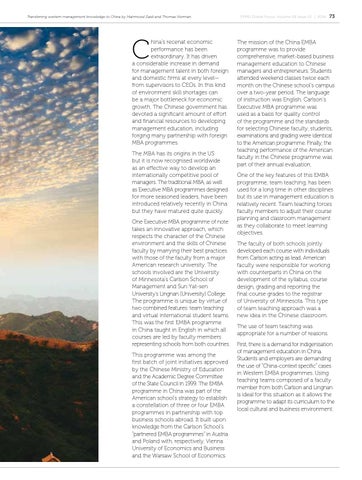Transferring western management knowledge to China by Mahmood Zaidi and Thomas Norman
C
hina’s recenat economic performance has been extraordinary. It has driven a considerable increase in demand for management talent in both foreign and domestic firms at every level— from supervisors to CEOs. In this kind of environment skill shortages can be a major bottleneck for economic growth. The Chinese government has devoted a significant amount of effort and financial resources to developing management education, including forging many partnership with foreign MBA programmes. The MBA has its origins in the US but it is now recognised worldwide as an effective way to develop an internationally competitive pool of managers. The traditional MBA, as well as Executive MBA programmes designed for more seasoned leaders, have been introduced relatively recently in China but they have matured quite quickly. One Executive MBA programme of note takes an innovative approach, which respects the character of the Chinese environment and the skills of Chinese faculty by marrying their best practices with those of the faculty from a major American research university. The schools involved are the University of Minnesota's Carlson School of Management and Sun Yat-sen University's Lingnan (University) College. The programme is unique by virtue of two combined features: team teaching and virtual international student teams. This was the first EMBA programme in China taught in English in which all courses are led by faculty members representing schools from both countries. This programme was among the first batch of joint initiatives approved by the Chinese Ministry of Education and the Academic Degree Committee of the State Council in 1999. The EMBA programme in China was part of the American school’s strategy to establish a constellation of three or four EMBA programmes in partnership with top business schools abroad. It built upon knowledge from the Carlson School's "partnered EMBA programmes" in Austria and Poland with, respectively, Vienna University of Economics and Business and the Warsaw School of Economics.
EFMD Global Focus: Volume 08 Issue 01 | 2014
73
The mission of the China EMBA programme was to provide comprehensive, market-based business management education to Chinese managers and entrepreneurs. Students attended weekend classes twice each month on the Chinese school’s campus over a two-year period. The language of instruction was English. Carlson’s Executive MBA programme was used as a basis for quality control of the programme and the standards for selecting Chinese faculty, students, examinations and grading were identical to the American programme. Finally, the teaching performance of the American faculty in the Chinese programme was part of their annual evaluation. One of the key features of this EMBA programme, team teaching, has been used for a long time in other disciplines but its use in management education is relatively recent. Team teaching forces faculty members to adjust their course planning and classroom management as they collaborate to meet learning objectives. The faculty of both schools jointly developed each course with individuals from Carlson acting as lead. American faculty were responsible for working with counterparts in China on the development of the syllabus, course design, grading and reporting the final course grades to the registrar of University of Minnesota. This type of team teaching approach was a new idea in the Chinese classroom. The use of team teaching was appropriate for a number of reasons. First, there is a demand for indigenisation of management education in China. Students and employers are demanding the use of “China-context specific” cases in Western EMBA programmes. Using teaching teams composed of a faculty member from both Carlson and Lingnan is ideal for this situation as it allows the programme to adapt its curriculum to the local cultural and business environment.
